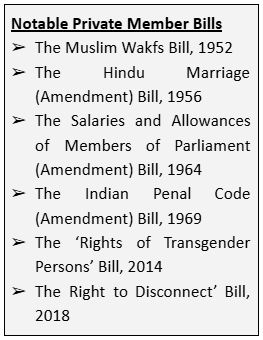Syllabus: GS2/Polity & Governance
Context
- Despite its potential to introduce progressive laws, India’s Private Member’s Bill mechanism has steadily eroded over the years because frequent disruptions, adjournments, and the prioritization of government business.
About the India’s Legislative Process
- All legislative proposals are brought before Parliament in the form of Bills that can be introduced in either the Lok Sabha (Lower House) or Rajya Sabha (Upper House).
- A Bill is a statute in draft, and no Bill can become law until it has received the approval of both the Houses of Parliament and assent of the President of India (Article 111).
- India’s legislative framework allows for two types of Bills:
- Public Member Bills (introduced by Ministers), aka Government Bills; and
- Private Member Bills (introduced by MPs who are not Ministers).
- While Public Member Bills form the majority of laws passed, Private Member Bills serve as an important tool for MPs to propose independent legislation.
| Constitutional Provisions for Introduction and Passing of Bills in India – Parliament of India: Articles 107-111 – State Legislatures: Articles 196-201 Introduction of Bills – Types of Bills: 1. Ordinary Bills (Article 107): These can be introduced in either Lok Sabha or Rajya Sabha. 2. Money Bills (Article 110): These can only be introduced in Lok Sabha, with the Rajya Sabha having limited powers. 3. Financial Bills (Article 117): These require the President’s recommendation before introduction. 4. Constitutional Amendment Bills (Article 368): These require a special majority for passage. |
Private Member Bills

- These allow non-Minister MPs to introduce legislation reflecting personal convictions, constituency demands, or emerging social needs.
- The last two and half hours of the Sitting every Friday are usually allotted for the transaction of Private Members’ business.
- Alternate Fridays are made available for Private Members’ Bill, the other Friday being devoted to Private Members’ Resolutions.
Decline in Private Member Bill Discussions: Trends
- Since Independence, only 14 Private Member Bills have been passed and received presidential assent.
- No Private Member Bill has cleared both Houses of Parliament since 1970.
- 17th Lok Sabha (2019-24): 729 Private Member Bills were introduced in the Lok Sabha, and 705 in the Rajya Sabha.
- However, only two in the Lok Sabha and 14 in the Rajya Sabha were ever discussed.
- 18th Lok Sabha (2024-Present): Only 20 MPs have introduced Private Member Bills so far.
- During the Budget Session of 2024, 64 Private Member Bills were introduced in the Lok Sabha, but none were discussed.
Significance of Private Member Bills (PMBs)
- Encouraging Legislative Innovation: Private Member Bills provide MPs with a platform to introduce laws beyond party mandates.
- Examples include the Right to Disconnect Bill, which sought to grant employees the legal right to disengage from work-related communication beyond official hours.
- Democratic Engagement and Accountability: Empowers ordinary MPs to influence policy, thus strengthening parliamentary democracy.
- Encourages diverse viewpoints and grassroots concerns to be raised in the House.
- Pressure Mechanism on the Government: PMBs often trigger debates and create public pressure, prompting the government to act on the issues raised.
- Policy Testing Ground: PMBs act as a testing field for public and political reaction to policy ideas.
Reasons for Decline in PMBs
- Lack of Legislative Time: Only Fridays are allotted for PMBs in both Houses, and even those sessions are often disrupted or adjourned. Government business takes precedence, leaving little time for PMB discussions.
- Low Priority by Government and Whips: Ruling parties discourage MPs from supporting PMBs that contradict or overlap with government policies. Lack of official backing means PMBs often fail to garner enough support.
- Procedural Hurdles: PMBs must pass through rigorous scrutiny and multiple stages like introduction, debate, and voting. Bureaucratic red tape and scheduling delays reduce the chance of progress.
- Executive Dominance in Legislature: Fusion of powers in the Indian system gives the executive significant control over legislative functions. This makes it harder for non-ministerial MPs to push independent legislative agendas.
- Lack of Political Will: PMBs are often viewed as symbolic rather than practical. Many MPs introduce PMBs for visibility or constituency signalling, not with the intent to see them passed.
Way Forward: Recommendations for Revival
- Prioritizing Private Member Bill Discussions: Allocate dedicated time slots for Private Member Bill debates to ensure meaningful legislative engagement.
- Reducing Disruptions: Prevent pre-emptive adjournments that hinder Private Member Bill discussions.
- Encouraging Cross-Party Collaboration: Foster bipartisan support for Private Member Bills that address pressing social and economic issues.
- Priority Committee for PMBs: Establish a dedicated committee of experts and MPs to screen and shortlist high-impact PMBs for prioritized debate and voting.
- Extend Working Hours of Parliament: Increase sitting hours or allocate evening sessions to ensure that both government and private members’ business receive adequate time.
Conclusion
- Reviving the Private Member’s Bill mechanism is crucial for strengthening India’s democracy and ensuring legislative diversity.
- By prioritizing discussions, reducing disruptions, and fostering collaboration, India can restore the significance of Private Member Bills, allowing MPs to contribute meaningfully to the nation’s governance.
| Daily Mains Practice Question [Q] Discuss the significance of reviving the Private Member’s Bill mechanism in India’s legislative process. How does its decline affect democratic governance, and what steps can be taken to ensure its effective implementation? |
Previous article
India Justice Report 2025: A System Failing the Common Citizen
Next article
Strengthening Parliamentary Oversight in India